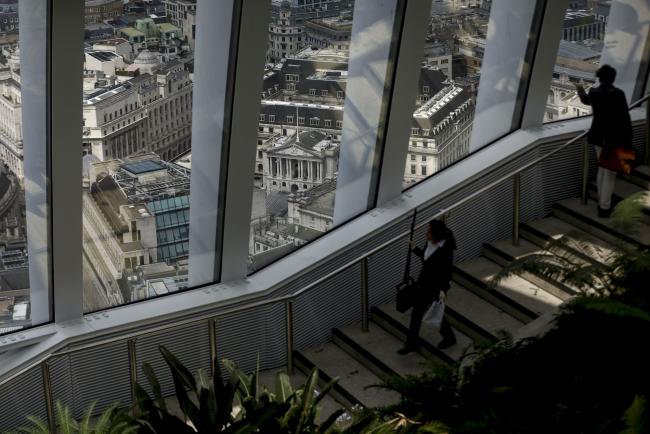(Bloomberg) -- A closely watched measure of U.K. economic activity unexpectedly surged to the highest level since 2018 in January, leaving the prospects for a Bank of England interest-rate cut next week hanging in the balance.
IHS Markit’s flash index for output across the whole economy jumped to 52.4 as firms cited reduced political uncertainty in the wake of Boris Johnson’s decisive election victory. That’s up from 49.3 last month.
The Purchasing Managers Indexes had emerged as a key factor in the debate over BOE easing this month, providing the most up-to-date assessment of the economy after the Conservatives’ win on Dec. 12. While the reading was higher than forecast and above the level many economists said was enough to stave off a rate cut, traders were still pricing in a greater-than 50% chance of a move after the release and the pound was little changed.
The data was “marginal above the level of 52, where one could expect the Bank of England starting to become more reluctant to cut,” said Mikael Olai Milhoj, a Danske Bank analyst. A cut is “still a real possibility but a close call as things stand.”
One reason why the debate over the need for easing may not be over is that BOE officials have also indicated that reports from their agents -- a cross-country network that holds confidential conversations with businesses and community organizations -- could prove critical. Investors and forecasters will be in the dark about that intelligence until the decision is announced, when the accompanying Monetary Policy Report will include a section summarizing the feedback.
Markit said the Friday’s composite figure, which was up from 49.3 last month and came in well above the 50.7 median-estimate of economists, was consistent with a quarterly growth rate of about 0.2%. That’s good news for Johnson as he prepares to officially take the U.K. out of the European Union next week.
“It seems likely that the rise in the PMI kills off the prospect of an imminent rate cut, with policy makers taking a wait and see approach as they assess the performance of the economy in the post-Brexit environment,” said Chris Williamson, Markit’s chief business economist.
While a January rate cut was seen as unlikely at the start of 2020, a spate of weak data, along with dovish comments from policy makers, boosted speculation a move was coming. Bets moderated slightly this week after some more positive releases.
Two of the BOE’s nine officials have already voted for easing, while a number of others, including Governor Mark Carney, have indicated they would be paying close attention to the data before making up their minds.
“We think it’s a close call,” said Ned Rumpeltin, European head of foreign exchange at Toronto-Dominion Bank. “But ultimately we think the sum total of what we’ve seen in the UK’s recent data overall will be enough to motivate a cut next week.”
The PMIs, like a report earlier this week from the Confederation of British Industry, showed optimism among firms had jumped following the election, with Markit’s measure reaching the highest since June 2015. They also suggested the pickup may translate into real growth, with measures of new work rising strongly.
The flash readings, based on 85% of responses, showed a gauge for the U.K.’s dominant services sector alone jumped to a 16-month high of 52.9, from 50 last month. Meanwhile an index for manufacturing reached 49.8, up from 47.5 in December and approaching the 50 level that separates expansion from contraction. Final readings will be released in the first week of February
The PMIs have previously come under criticism for being overly sensitive to political developments, while Carney said last year that they can be a misleading indicator of economic output in times of extreme uncertainty.
For example, in the immediate aftermath of 2016’s Brexit vote, they presented a far gloomier picture of the economy than ultimately came to pass, a phenomenon that repeated itself last year.
